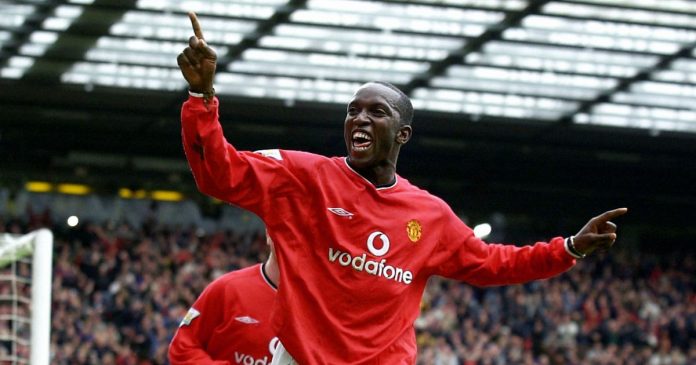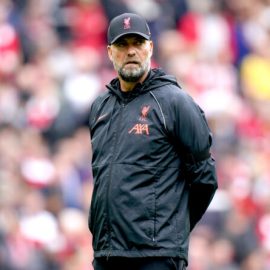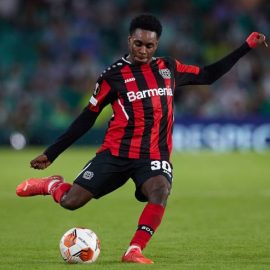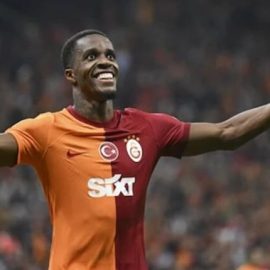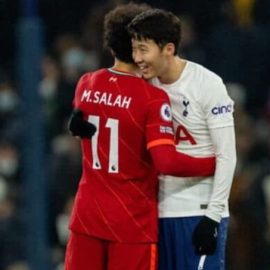Steven Gerrard rarely likes watching games from the sidelines, but he was all smiles last night as he watched a Liverpool legends side featuring some of his boyhood heroes–Kenny Dalglish included–defeat an all-stars team managed by the unlikely duo of Ricky Tomlinson and Jamie Carragher, in the Hillsborough/Marina Dalglish Memorial Match at Anfield.
Gerrard was part of the presentation committee who welcomed the legends to the field, and was introduced to the impressive 20,000 plus crowd at Anfield as “The Newly-Crowned Football Writers’ Player of the Year”. The first Liverpool player since John Barnes in 1990 to achieve such a feat.
His manager, Rafael Benitez, was in the stands too, in good spirits as well. And no wonder, Benitez is famous–infamous to some extent–for valuing team cohesion over individual expression, but it is highly likely the recognition of Gerrard’s most consistent season will have brought a smile to the lips of the Spaniard. After all, the Liverpool captain owes a huge chunk of the credit to the man from Madrid.
When Benitez landed at Anfield in the summer of 2004, one of the first things he was told by the Chief Executive, Rick Parry, was that “Gerrard wants out”. The skipper had lost faith in the direction in which the club was headed, and had grown tired of bailing out sub-standard team-mates for little or no reward. Benitez had little input in Gerrard’s decision to snub the advances of Chelsea that summer, with Parry himself explaining that “As soon as he came home (from Euro 2004) and was back with his family, he reached the conclusion that he couldn’t leave. It was his club.” Benitez had kept his captain and best player, but only just.
And during a problematic first season for the Spaniard on Merseyside, it was clear that Gerrard, whilst often the solution for Liverpool, was also part of the problem for Benitez, and the style of play he wished to impose on the club. Gerrard scored big goals and produced big performances but, without the solidity around him and the reliability up front, his firefighting tendencies often left midfield sparse, lesser players exposed and the player himself frustrated. Gerrard, rightly, earned plaudits and iconic status for his exploits in Istanbul in May 2005 but it is Benitez who gave his captain the freedom from which to drag his side back into a seemingly-redundant contest. The introduction of Didi Hamann at half-time in the Ataturk Stadium is seen by many to be a masterstroke, but cynics will point out that leaving the German out in the first place may have contributed to the half-time deficit, as Kaka roamed free of Gerrard and Xabi Alonso to devastating effect.
As a coach, Benitez is fascinatingly intricate. His tactics are as detailed as his demands; Gerrard spent his young career flitting between right midfield and central midfield, with the emphasis always on what he (thought he) did best- tough tackling, raking crossfield passes, thirty-yard thunderbolts, driving runs. Benitez’s approach is more specific, more scientific. During his early days at Liverpool, Rafa would tell Gerrard he needed to score more, to keep possession better, to tackle in the right areas, to retain the side’s shape better. As Guillem Balague puts it in the excellent book A Season on the Brink, Gerrard was left wondering “What exactly am I doing right?”
Perhaps it was these insecurities and worries that led to the commotion of summer 2005, where Gerrard handed in a transfer request before performing a next-day U-turn to snub the advances of Chelsea. Just weeks after lifting the European Cup in Turkey, Liverpool’s captain was contemplating a future in blue rather than red, but a last minute change of heart, and some smoothing words from former Chairman David Moores, meant he would commit his long term future to the club.
That following season Liverpool progressed in the Premier League, without ever looking like serious contenders. Gerrard meanwhile was used predominantly as a right sided midfielder, or as a second striker behind Peter Crouch or Djibril Cissé. It was not something he was particular used to, despite his early days on the right wing- he would label it “The graveyard shift” in his autobiography. Nevertheless, it led to his most prolific season to date, 23 goals in all competitions vindicated Benitez’s decision, but dissent raged amongst the sports writers, particularly in view of his seemingly-diminished performances for England, which culminated in a missed penalty during their World Cup quarter final defeat to Portugal in 2006. Gerrard, it was decided, was a central midfielder. No more, no less. Play him in the middle, or lose part of his game.
Even Gerrard himself admits to a sense of despair when asked in a World Cup warm up match to play as a withdrawn striker off Peter Crouch, in his autobiography he claims “I was gutted when I walked into the Old Trafford dressing room and saw the number nine shirt hanging on my peg. Number 9? Talk about pressure! I am an attacking midfielder, not an emergency striker.”
He may have scored in that match against Hungary (a striker’s goal too!), but Gerrard was in no doubt where his best position lay. The centre of midfield. Debate rumbled on, tediously of course, over the merits of using him wide, or further forward, or deeper. Benitez seemed determined to prove a point, utilising Sissoko, Alonso and even Bolo Zenden in the centre of midfield during the 2006/07 season, before signing up Javier Mascherano to add to his options. Gerrard, it seemed, would have to adapt.
But Benitez had a plan all along; his coaching was getting the best out of his captain, who was learning a new position with relish and increasing confidence. The arrival of Fernando Torres in 2007 meant for the first time under Benitez, Liverpool had a centre forward with the intelligence, pace and physical presence to bring the best out of Gerrard. The pair hit the ground running, Gerrard’s through-ball giving Torres the chance to open his Anfield account against Chelsea on his home debut. Suddenly Gerrard’s role was clear, a link man between midfield and attack.
In Mascherano and Alonso, Benitez has both the defensive screen in front of his back four, and the means of getting the ball into his front players with variation and consistency. Gerrard from deep is effective enough, but more hit and miss with his passing as he often looks for “killer” passes. Given license to roam in behind a focal point of Torres’ quality, his best attributes can be accentuated. He will never tame his urge for a big tackle–though the marked improvement to his disciplinary record under Benitez is testament to the strides made to his timing–or his desire to go for the block-busting pass or shot. But in his assumed role, these details are encouraged rather than discouraged, and his productivity has soared in tandem with Torres, and drawn vast improvements from the likes of Dirk Kuyt and Yossi Benayoun- though not as yet from Ryan Babel unfortunately.
Benitez is keen to stress that his skipper is learning the game still, and Gerrard himself has shown a desire for constant self-improvement that perhaps had waned in the latter days of the Houllier-regime. And has reaped the rewards. His awareness has improved ten-fold, and no longer does he expend pointless energy chasing down balls that Mascherano or Alonso can chase for him. It means he can focus more energy on what he does when the ball is at his feet. His partnership with Torres is developing with each and every game, and his finishing has improved no end.
Of course he isn’t infallible, Michael Essien showed in the recent Champions League clash that Gerrard can be neutralised, but then that has been the exception that proves the rule. So far this season Liverpool’s captain has scored 15 Premier League goals, assisting a further 8, with 6 man of the match performances. Add to that the 7 Champions League goals, and the FWA award, and you have Gerrard’s best season to date–even surpassing the trophy-laden seasons of 2005 and 2006. Debate may rage as to whether he was a deserving winner of the award, considering Manchester United’s excellent campaign, but few can argue that Gerrard’s season has not been one of consistent excellence. And for that, Benitez must take a huge slice of the pie.
Add Sportslens to your Google News Feed!
